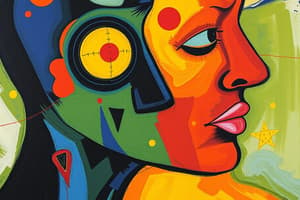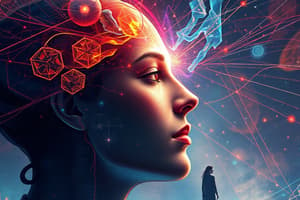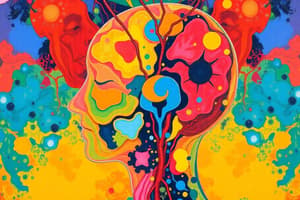Podcast
Questions and Answers
What is the primary difference between sensation and perception?
What is the primary difference between sensation and perception?
Sensation is the detection of physical stimuli through sensory organs, while perception is the brain's interpretation of these sensory inputs.
Describe the process of transduction in sensory systems.
Describe the process of transduction in sensory systems.
Transduction is the conversion of physical energy from stimuli, such as light or sound, into neural signals that can be interpreted by the brain.
Name the six senses and briefly explain one of them.
Name the six senses and briefly explain one of them.
The six senses are vision, hearing, touch, taste, smell, and proprioception. Vision enables sight by detecting light, color, and movement.
What role do sensory receptors play in the process of sensation?
What role do sensory receptors play in the process of sensation?
Explain sensory adaptation and provide an example.
Explain sensory adaptation and provide an example.
How do the olfactory bulbs influence emotions and memory?
How do the olfactory bulbs influence emotions and memory?
What is stress-induced analgesia and why is it important?
What is stress-induced analgesia and why is it important?
Define reflexes and give an example of a common reflex action.
Define reflexes and give an example of a common reflex action.
What differentiates instincts from learned behaviors?
What differentiates instincts from learned behaviors?
What are the three main processes involved in memory?
What are the three main processes involved in memory?
Explain the difference between associative and non-associative learning.
Explain the difference between associative and non-associative learning.
Describe the main outcome of Pavlov's classical conditioning experiment.
Describe the main outcome of Pavlov's classical conditioning experiment.
Describe the difference between declarative and non-declarative memory.
Describe the difference between declarative and non-declarative memory.
What are the two types of reinforcement in operant conditioning?
What are the two types of reinforcement in operant conditioning?
What are the Big Five personality traits?
What are the Big Five personality traits?
How did Bandura's Bobo doll experiment demonstrate observational learning?
How did Bandura's Bobo doll experiment demonstrate observational learning?
Explain Freud's Iceberg Model of the psyche.
Explain Freud's Iceberg Model of the psyche.
What is Maslow's Hierarchy of Needs?
What is Maslow's Hierarchy of Needs?
What distinguishes emotions from moods?
What distinguishes emotions from moods?
What role does the DSM-V play in psychology?
What role does the DSM-V play in psychology?
What role does the amygdala play in the emotional response?
What role does the amygdala play in the emotional response?
Identify two types of psychological disorders and give an example of each.
Identify two types of psychological disorders and give an example of each.
What stages of memory are essential for processing emotional experiences?
What stages of memory are essential for processing emotional experiences?
What is the primary focus of humanistic therapy?
What is the primary focus of humanistic therapy?
Flashcards
Sensation
Sensation
The detection of physical stimuli like light or sound by sensory organs.
Perception
Perception
How the brain interprets sensory input to create meaningful experiences.
Transduction
Transduction
Converting physical energy into neural signals the brain can process.
Sensory Adaptation
Sensory Adaptation
Signup and view all the flashcards
Olfactory Receptors
Olfactory Receptors
Signup and view all the flashcards
Proprioception
Proprioception
Signup and view all the flashcards
Reflex
Reflex
Signup and view all the flashcards
Sensory Processes
Sensory Processes
Signup and view all the flashcards
Instinct
Instinct
Signup and view all the flashcards
Learned Behavior
Learned Behavior
Signup and view all the flashcards
Associative Learning
Associative Learning
Signup and view all the flashcards
Classical Conditioning
Classical Conditioning
Signup and view all the flashcards
Operant Conditioning
Operant Conditioning
Signup and view all the flashcards
Reinforcement
Reinforcement
Signup and view all the flashcards
Amygdala
Amygdala
Signup and view all the flashcards
Primary Emotions
Primary Emotions
Signup and view all the flashcards
Encoding
Encoding
Signup and view all the flashcards
Storage
Storage
Signup and view all the flashcards
Retrieval
Retrieval
Signup and view all the flashcards
Declarative Memory
Declarative Memory
Signup and view all the flashcards
Non-declarative Memory
Non-declarative Memory
Signup and view all the flashcards
Personality
Personality
Signup and view all the flashcards
Big Five Traits
Big Five Traits
Signup and view all the flashcards
DSM-V
DSM-V
Signup and view all the flashcards
Study Notes
Sensation vs. Perception
- Sensation is the detection of physical stimuli (light, sound) through sensory organs.
- Perception is the brain's organization and interpretation of sensory input.
The Sensory Processes
- Detection: Sensory organs interacting with stimuli.
- Transduction: Converting physical energy (light, sound, chemicals) into neural signals.
- Transmission: Sensory neurons transmitting neural signals to the brain for processing.
Sensory Systems
- Vision: Eyes detect light, color, and movement.
- Hearing (Auditory): Ears detect sound and convert into neural signals.
- Touch (Tactile): Skin receptors detect pressure, temperature, and pain.
- Taste (Gustatory): Taste buds on tongue recognize different tastes (sweet, salty, sour, bitter, umami).
- Smell (Olfactory): Nose uses olfactory receptors to detect odors.
- Proprioception: Sensing body position and balance through receptors in muscles and joints.
Sensory Receptors and Neurons
- Specialized cells like rods and cones (eyes) or olfactory neurons (nose) detect stimuli and convert them to neural signals.
Sensory Adaptation
- Receptors become less sensitive to constant stimuli (getting used to a smell or feeling clothes).
Reflexes and Instincts
- Reflexes are automatic responses (blinking).
- Instincts are complex, inborn behaviors for survival.
Learned Behaviors
- Acquired through experience, unlike reflexes.
Associative vs. Non-Associative Learning
- Associative Learning: Forming connections between stimuli or consequences (e.g., classical and operant conditioning).
- Non-Associative Learning: Changes in response to a single stimulus; habituation and sensitization.
Classical Conditioning (Pavlov's Experiment)
- Pavlov's Dogs: Neutral stimulus (bell) associated with a stimulus (food) elicits a conditioned response (salivation).
Operant Conditioning (Skinner's Box)
- Behavior modified by consequences (reinforcement, punishment).
Observational Learning (Bandura's Bobo Doll)
- Learning through observation of others' behaviors.
Emotions
- Emotions are complex reactions with physiological responses, expressive behaviors, and subjective experience.
- Emotions are temporary and intense; moods are long-lasting and less intense.
- Primary emotions: happiness, sadness, fear, anger, surprise, disgust (Ekman).
Brain Regions and Emotions
- Amygdala: Essential for processing emotions, particularly fear.
- Thalamus: Relays sensory information to the correct brain regions.
- Hippocampus: Links emotions to memories.
Memory Stages
- Encoding: Initial conversion of sensory input into memory.
- Storage: Maintaining memory over time.
- Retrieval: Accessing and using stored information.
Types of memory
- Sensory Memory: Brief, immediate sensory information storage
- Working Memory: Holds and manipulates active information
- Long-Term Memory: Information stored for extended periods.
Declarative vs. Non-Declarative Memory
- Declarative: Explicit memories (facts, experiences).
- Non-declarative: Implicit memories (motor skills, conditioned responses).
Personality
- Personality: Unique pattern of thoughts, feelings, and behaviors.
- Big Five Traits: Openness, conscientiousness, extraversion, agreeableness, neuroticism.
Freud's Psychodynamic Theory
- Id (instincts), ego (reality), superego (morality).
- Defense mechanisms (repression, denial, projection).
Humanistic Perspective
- Maslow's Hierarchy of Needs: Physiological to self-actualization.
- Rogers: Emphasized self-concept, unconditional positive regard.
Psychological Disorders (DSM-V)
- Diagnostic criteria for mental health disorders.
- Types of disorders: Anxiety disorders (GAD, panic attacks, phobias, OCD).
Psychotherapy
- Types of therapy: Family, humanistic, cognitive-behavioral (CBT), psychodynamic.
Stress and Coping
- Stress is a psychological and physiological response to demands.
- General Adaptation Syndrome (alarm, resistance, exhaustion).
- Coping mechanisms (problem-focused, emotion-focused, building resilience).
Studying That Suits You
Use AI to generate personalized quizzes and flashcards to suit your learning preferences.




